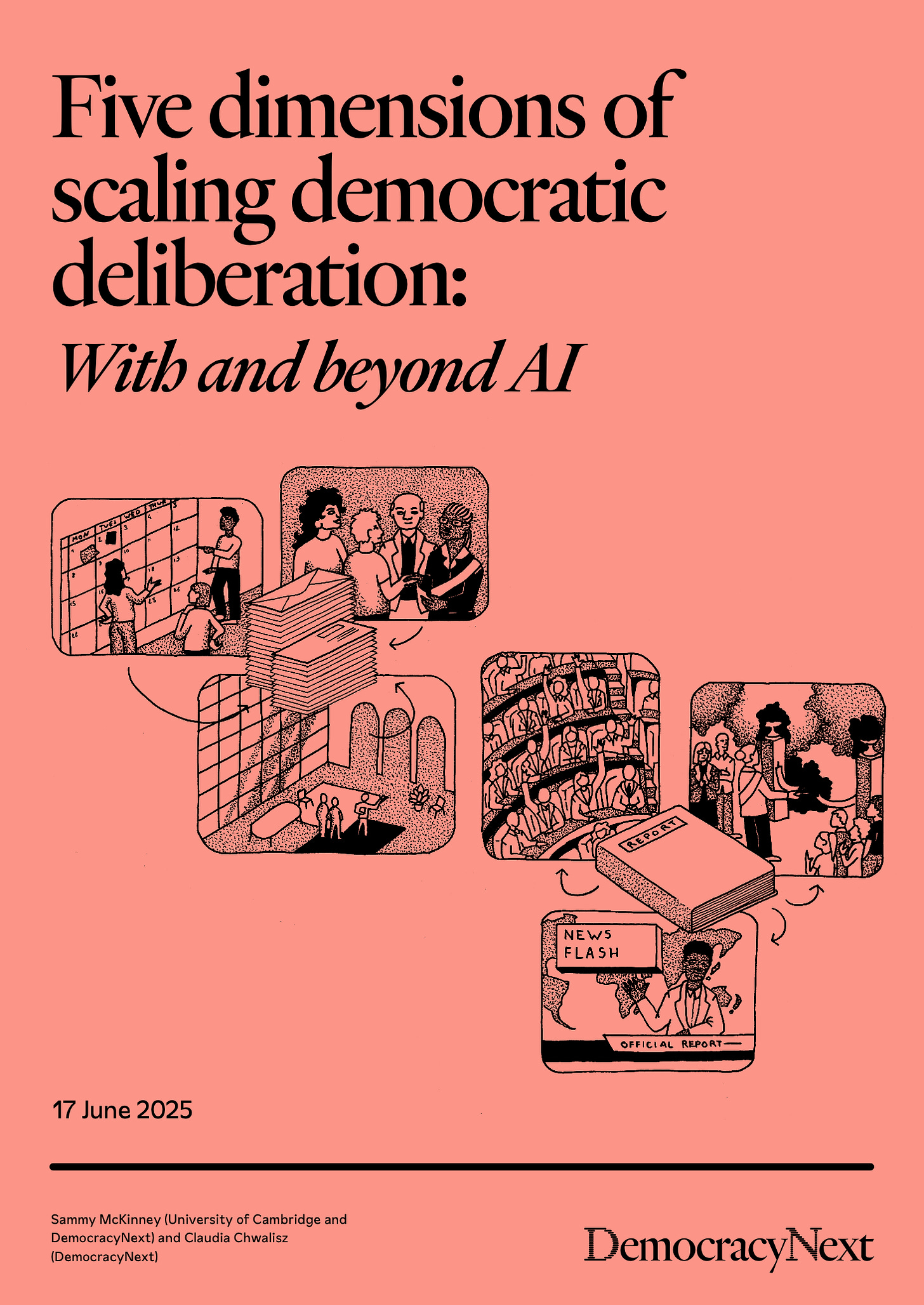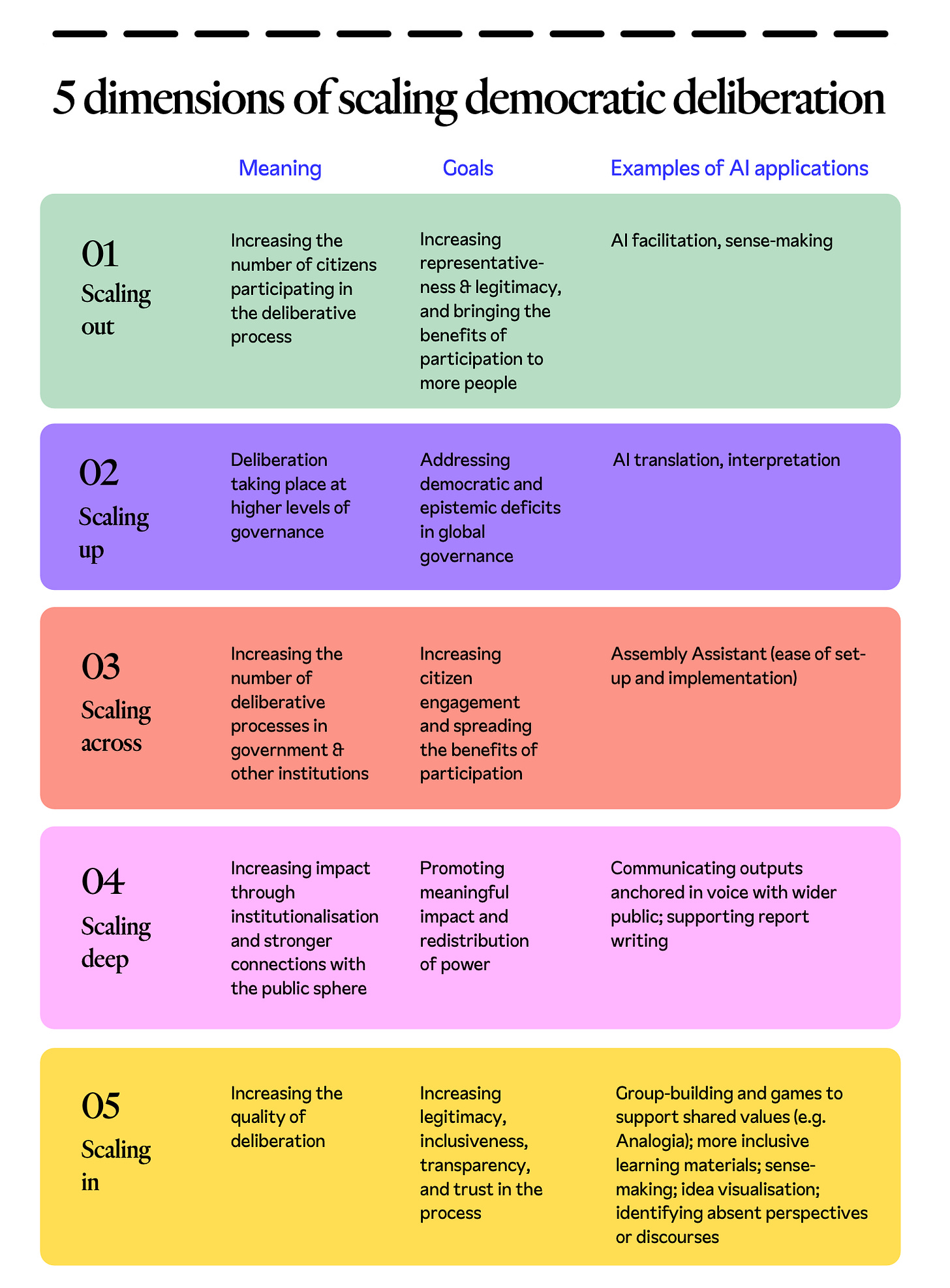Five dimensions of scaling democratic deliberation: With and beyond AI
Read our latest paper, watch the launch webinar, and leave us your comments or feedback!
We’re still buzzing from the energy at the launch event of our newest paper, Five dimensions of scaling democratic deliberation: With and beyond AI.
Thanks to all of you who joined us to hear Sammy McKinney (AI and Deliberation Fellow at DemocracyNext and PhD student at the University of Cambridge), and Claudia Chwalisz (Founder and CEO of DemocracyNext) present their arguments, and hear sharp and rich reflections from Oliver Escobar (University of Edinburgh), Kyle Redman (AI and Democracy Foundation), and Manon Revel (Meta).
Our moderator Andrew Sorota (Office of Eric Schmidt) kicked us off with remarks reminding us about the precarious position of democracies around the world, which is why we’re interested in this conversation and thinking about an alternative path forward.
Oliver welcomed Sammy and Claudia’s thought-provoking take on different dimensions of scale, as well as the balance of opportunities and risks. He challenged their scepticism about mass deliberation, and also reflected on the need for the fields of civic tech and democratic innovation to work better together on building the tech needed for deliberative democracy.
Kyle liked the authors’ ‘judo move’ to touch on the default position of scale (increasing headcount), and then to spotlight the other important transformations that need to take place with the other four dimensions — saying that maybe they’re even more important. He also stressed the need for better metrics and measurement (something he’s working on) so we can more accurately determine the impact, what’s possible, and which is the right direction for utilising AI and other process design decisions.
Manon talked about the narrow path between under- and over-reliance on AI in democratic processes — where under-reliance risks missed opportunities, but over-reliance risks disempowerment and post-rationalised legitimacy. She also reminded us that while the intersection of democracy x technology is quite old, what’s new and exciting today is the possibility of aggregating open-ended thoughts to create argumentatively-coherent summaries.
➡️ Watch the webinar recording here.
The intersection of technology and democracy represents one of the most consequential challenges of the 21st century.
As technologies like AI develop rapidly, we face critical choices about how they will shape – or undermine – our democratic futures.
In their new paper, McKinney and Chwalisz emphasise that they see the debate about how to scale deliberation through a political lens, where their goals are focused on how to enable a citizenry that is resilient to the forces of autocracy – one that feels and is more powerful and connected, where people feel heard and empathise with others, where citizens have stronger interpersonal and societal trust, and where public decisions have greater legitimacy and better alignment with collective values.
Against this backdrop, they ask:
What does scaling democratic deliberation mean, why is it valuable, and what is the role of AI in enabling it?
In this paper, McKinney and Chwalisz aim to make two core contributions to the field:
Offering an expanded definition of scale by breaking down the concept across five dimensions: scaling out (increasing deliberator numbers), scaling up (higher governance levels), scaling across (increasing number of processes), scaling deep (increasing impact), and scaling in (improving deliberative quality). The concept of scale is used in various ways across deliberative practice, and they introduce this new typology to overcome this fragmented usage, guide critical discussion, and expand our collective understanding.
Proposing that scaling democratic deliberation is not a technological challenge alone, but one that requires a diverse repertoire of technological applications to be developed and fruitfully combined with strengthened civic infrastructure. This provocation aims to guide and stimulate action across the field, emphasising that whilst AI can play a crucial role in scaling deliberation, we must also keep a critical eye on its limitations and risks, and combine it with the civic infrastructure that is necessary for scaling.
Two future trajectories
McKinney and Chwalisz present two future areas of focus for their next research and papers:
1. Expanding our repertoire of critically informed deliberative technologies
We need to develop a broad and critically-informed repertoire of deliberative technologies that support and complement deliberative processes across the five dimensions of scaling. A holistic view of scale should guide technological innovation, and this should be reflected in broader explorations around the role that AI can play in increasing the quality, impact, and number of deliberative processes, as well as the number of citizens they reach.
An important next step for their action-orientated research is to rigorously map out and critically analyse AI applications across the full life cycle of deliberative processes whilst keeping this holistic understanding of scale in mind.
2. The limits of AI and the importance of civic infrastructure
Scaling democratic deliberation is not susceptible to a technological fix alone; it requires careful technological integration alongside broader processes of social and political change.
There are limits to AI’s potential for scaling deliberation, and therefore exploring the civic infrastructure that is required for catalysing scaling is necessary. To this end, in a forthcoming paper we are planning to do a deep dive into what we consider as a leading example of robust civic infrastructure for scaling deliberative practice: Arantzazulab, a democracy innovation lab in Spain’s Basque Country.
Conclusion: A hybrid approach
The path toward scaled deliberation will ultimately require bridging technological innovation with democracy's fundamental human elements – trust, connection, understanding, and collective agency.
By embracing this hybrid approach, we can work toward a democratic future where technology enhances rather than replaces the rich interpersonal dynamics at the heart of effective deliberation, helping to build democratic resilience in an increasingly complex world.
We look forward to developing this work further, and welcome your questions, comments, and feedback.
➡️ Watch the launch webinar here.
📡 On our radar
Assessing the Role of Democratic Innovations in Environmental Sustainability: A Systematic Literature Review, highlights why institutionalisation is so important for impact. (José Duarte Ribeiro, Roberto Falanga, João Moniz).
As Bristol, UK, prepares for their first citizens’ assembly later this year, David Jubb of Citizens in Power, discusses why they’re a better way of doing politics with The Bristol Cable.
Aotearoa New Zealand's climate assembly reimagines democratic deliberation by centring Te Tiriti o Waitangi and Māori governance - offering a powerful, decolonising model for global practice (Emily Beausoleil for Cambridge University Press).
New research shows AI’s urban design tools risk reinforcing elite priorities while excluding public voices - highlighting urgent democratic challenges in smart city planning (Devdiscourse, May 2024).
“Making Civic Trust Less Abstract”, by Stefaan Verhulst and Andrew J. Zahuranec, introduces a practical framework to help city officials measure and strengthen civic trust through observable indicators and targeted interventions.
Moldova’s first citizens’ assembly was convened with 38 randomly selected citizens. Four recommendations were submitted to Moldovan authorities, parliament, and other national and international organisations.
Kosovo’s Congress took part in training on participatory democracy in Prizren on 3 and 4 June, gathering 28 local representatives from 10 Kosovo municipalities, the Ministry of Local Government, and the Municipalities Association.
🐝 Upcoming events
18-20 June, Sydney, Australia
DemNext Chief Strategy & Creative Officer, Lucy Reid, will be joining the Multispecies Justice Symposium at the University of Sydney and the public event Reimagining Democracy: How Diverse Knowledges are Creating More-than-Human Justice.
25 - 27 June, Verona, Italy
DemNext CEO, Claudia Chwalisz, and International Advisory Council Member, David Van Reybrouck, will be taking part in a discussion and workshop on ‘Reimagining Democracy Today Through Citizen Assemblies’ with the Director of Bard College’s Hannah Arendt Centre, Roger Berkowitz, at the Arendtian Counciliarism: Visions and Care for Democracy conference.






Thank you
You people are going about this the wrong way around if you are trying to build trust with citizens from the top down (from institutions to citizens).
It has to emerge from the citizens themselves and all we can really do is build something like a not for profit polling application that registers every citizen (and preferably the politically disenfranchised who cannot vote but who are part of our communities) and our opinions and political preferences (safely)on all the issues that need attention, from local to global.
It will then be up to government at all levels to connect with the "will of the people app" voluntarily and to display a government's commitment to democracy rather than the other way around.
Citizens political safety is paramount, and to shield the shy and nervous citizens from leaving a profile trail of political preferences on the App, a "choose your own expert" re-representation will allow citizens to shield themselves from political persecution, due to their views, via this re-representation function.
Furthermore, re-representation functions as a kind of tokenized power transfer of each question/issue released for debate and deliberation on the democracy App and political capital can begin to flow among members (representing other members) facilitating a blockchained knowledge economy that can be further expanded (especially at local government level) to help a community become self governing; shouldering some of the burdens of local government. With enough savings from efficient and effective governance, the basis for a UBI begin to slide into view as a possibility. A UBI financed by the power of such a democracy App.
Waiting for political power to come to the citizens, asking them what they need is childish and naive. People are weary and for good reason. Politics can turn dangerous pretty quickly. When political power comes knocking on the door there is historically good reasons to be weary.
As the saying goes... Just because I don't care about politics doesn't not mean politics doesn't care about me.
We the people can only build a register of need, desire and maybe even opinion. If a government chooses to engage with the App UI for elected officials, there is the signal that confirms democratic commitment. All the other stuff elected officials say about their desire to serve the community has, after many years, begun to sound like so much hot air escaping dubious orifices.
That's why democracy is now in trouble and losing its cool.